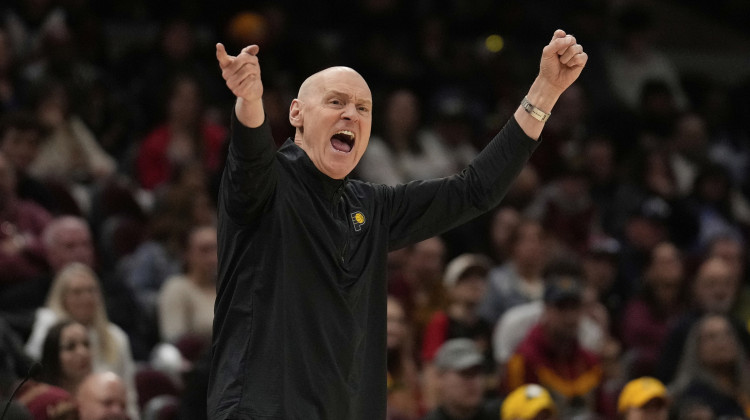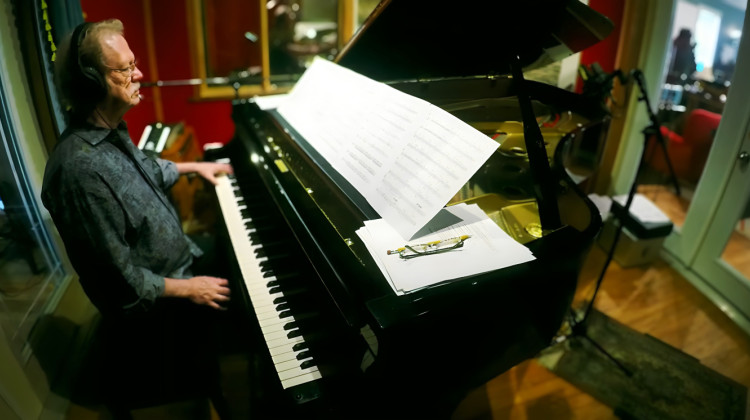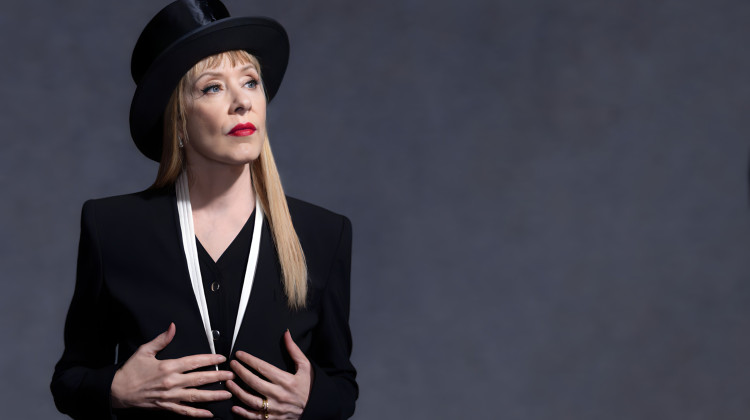For the first time Indianapolis has a black equity theater company. The Naptown African American Theatre Collective was officially formed earlier this year. It's putting on its first full production this week at the Phoenix Theatre Cultural Center downtown.
LaKesha Lorene is the founder and producing director of this new collective, and Dena Toler is one of the actors in the upcoming play “Detroit ‘67.” They spoke to WFYI’s Ray Steele in our studio.
RAY STEELE: Indy has seen a noticeable boost, at least it seems to me, of places for Black artists to tell their stories, especially since the social reckoning following George Floyd's murder in 2020 and the protests that followed. LaKesha, why do you think a black theater collective was needed right now?
LAKESHA LORENE: Yeah, NAATC was founded - and my vision for founding the theater was to make sure that our stories were told in a way that was truly representative of our culture. So NAATC is all about highlighting the beauty, power, and humanity of Black stories. And a lot of times as we've seen within the country, it's not noticed that we're humans until we're murdered, like George Floyd, like Breanna Taylor, like so many other names that across the country that we can't even count. So it's always been important to me, to Latrice Young, who was also our director of community engagement strategy, and to our entire organization, that we present stories in a way that still speak to everyone, but allow people to see themselves in Black bodies on the stage, as the world has been conditioned to imagine themselves and other artists, when they see them, in particular, on the stage. And also, on the other side of that things have not been equitable for some time in this country, for artists of color. So it's been important to me that, you know, artists and administrators can get compensated and paid for their work, and have sustainable, long standing careers, and not have to, you know, wait or be pushed out or move, which so many people have had to do not even all the time because they wanted to, but just out of necessity.
STEELE: When we're talking about a black equity Theatre Company, the word ‘equity’ has multiple meanings.
LORENE: It does, it does. I’m so glad you brought that up. So, equity, not only just refers to us being a woman/Black owned organization, with myself as the owner, but it also refers to being a part of the Actors Equity Association. So, there are certain rules and stipulations and protections that come with being under the umbrella of an equity theatre. With equity artists and equity theaters, those that are a part of the union, and even not a part of the union get the benefits from being under that umbrella. So, the first benefit for non-union actors, which the majority of our talent of color are not union actors in the city, is getting weekly paid compensation for their work in theater. Out of all the different types of art forms, in particular comparing theater and film, theater takes so much time. You have people working six days a week, and then once you get into performance, you're performing anywhere from 12 to 32, to 42 to 60 times. And those artists deserve to be compensated, and they deserve to have the opportunity to work at a place that will compensate them all throughout the year. So obviously, with this year, we have four shows within our inaugural season. And eventually, as we continue to grow, we want to have year-round programming that gives everyone the opportunity to work and be a part of that. So yeah, equity specifically refers to being a part of the only union for stage professionals, which is the Actors Equity Association.
STEELE: We'll talk about “Detroit ‘67” in a second, but how difficult was it to start a collective like this from scratch?
LORENE: Oh, my gosh, you know, it's extremely challenging, daunting and tiring. But at the same time, it's beautiful because the support we've received, specifically from our volunteers in the community, we have a shout out to the fam, we call them the fam, the NAATC fam. We have some amazing volunteers and people who really, truly believe and stand behind our vision. We have amazing partners in foundations and individual donors and growing corporate sponsorships that we would still continue to love to get support from to do the work that we do, because theater is an expensive business. But it's kind of mind blowing. Miss Latrice and I, who's the other co leader of this - I'm founder and producing director, she's director of community engagement, but truly is acting as COO in this company is I am CEO. And we were talking the other day and we were like, it's only been a year. It feels like it's been like six years, you know, and that just speaks to how much work goes into this? And which is all the more reason why our administrators need to be supported, you know, equitably, you know what I mean? And our actors, because without the administration, there is no company. And without the actors and the artists, there is no art. So, yeah, it's been a whirlwind, I think, I don't even know if it'll hit me. I get a little delayed, sometimes personally with things. So it probably won't hit me hit me yet. But every day I am encouraged by the love and support and excitement not just from our creative community of actors. But from the theaters around the city and the mentors I have and artistic directors that have sunsetted or are currently active. In particular, at the Phoenix Theatre Cultural Center, our partnership with them means so much to me, and Constance Macy's leadership and what they're doing with their group of resident theaters, which were included in that, that were able to be at a world class facility, and give our actors the opportunity to have that in our audience. The chance to have that while we're building our own building.
STEELE: Dena Toler, one of the actors in “Detroit 67, the first full production for the NAA, TC, before we talk about the show, what has it been like, as an actor working at a collective like this,
DENA TOLER: It has been an amazing experience. I have been acting in the city for a couple of decades now. And to have this sense of connection and the freeness and the safety, to discuss some of the themes or some of the things that I may be going through that I can bring to my character, and being in a safe space to be able to talk about those things. And even to break them down and, you know, be vulnerable enough to learn more about your character and about yourself, simply by being involved with this environment has been really amazing for me.
STEELE: As for “Detroit ‘67”, for people who know their history, that was a turbulent time. What specifically is this play about? What's the story?
LORENE: Well, without giving too much away, it's really about family. It's about a brother and sister in Detroit in 1967, who have an extended family and their neighborhood and their community, and tragedies and things of the turbulent times went on, and it really is a reflection on despite it all how there is always some kernel of hope.
TOLER: And through this story, as LaKesha was saying earlier, yes, it's a Black story with Black people. But there are so many themes in it when you can look at somebody else and say, you know what, I can feel that way too. I understand that. And that's the beauty of theater. It's a story out loud. When you have that little time with the audience and the cast at that moment, we create our own world. And so, I think it's just beautiful for us to be able to encompass white audience members and Black audience members that may not know about that turbulent time, and we can give them that history and also hope.
STEELE: There are some who will look at that and say ‘that was more than five decades ago. How is that relatable to me?’ We know better, but how do you explain that to the person who might say that?
LORENE: Oh, man. Well, first of all, shout out to Dominique Moore. So, who was one of my favorite playwrights who has been dubbed as the new August Wilson, who has a cycle of plays was a fellow Midwestern woman from Detroit. And this show is a premiere in Indianapolis, it has not been done yet. And I think what's so brilliant about her writing is that it's relatable. And it's real. You know, as Dena mentioned, it's the story centers around the two sibling characters, their extended family, this mysterious woman that shows up on their couch one night and flips their world upside down. And unfortunately, there are so many things that are exactly like that time that the audience will recognize. And my hope with theater is always that, as Dena mentioned as well, it's a reflective space. So, when you watch a show, you're at intermission, when you hear this when you see that, and you notice the similarities between ‘67 and 2023. My hope is that it motivates you to do something within your sphere of influence. There's never anything too small that you can do to help your community. And I think that once people see this show, they'll be motivated to see different perspectives, to love a little harder to, consider other points of view that they haven't before. And to know that just like you, Chelle is this big sister, you know, Sly has big dreams, Caroline is trying to figure out a way in life, and Link is also doing the same and they're trying for something new. So, there's a lot of mirrors to now. And again, like I said, I really hope that it invigorates and motivates people to do something.
TOLER: And even sparking a conversation. You know what I mean? You know, I really believe and one of the things I love about theater is, you know, of course, you go to the movies, but when you're in theater, and you're talking about it on the way to the car, or when you have to sit there for a minute and like, ‘whoa,’ you know, even that little spark of the things that you think about, maybe that's something you'll share with a coworker at work tomorrow or your kids or it's, you know, it's this, that little thing, that's the beauty about art is that it just spreads, you know, and I love that we are doing something beautiful like this. So cool.
Dena Toler is one of the actors in “Detroit ‘67”, and LaKesha Lorene is founder and producing director of the Naptown African American Theatre Collective.
“Detroit ’67” runs from August 25 through September 10. At the Phoenix Theatre Cultural Center in downtown Indianapolis. Information is available at naatcinc.org.
 DONATE
DONATE







 Support WFYI. We can't do it without you.
Support WFYI. We can't do it without you.